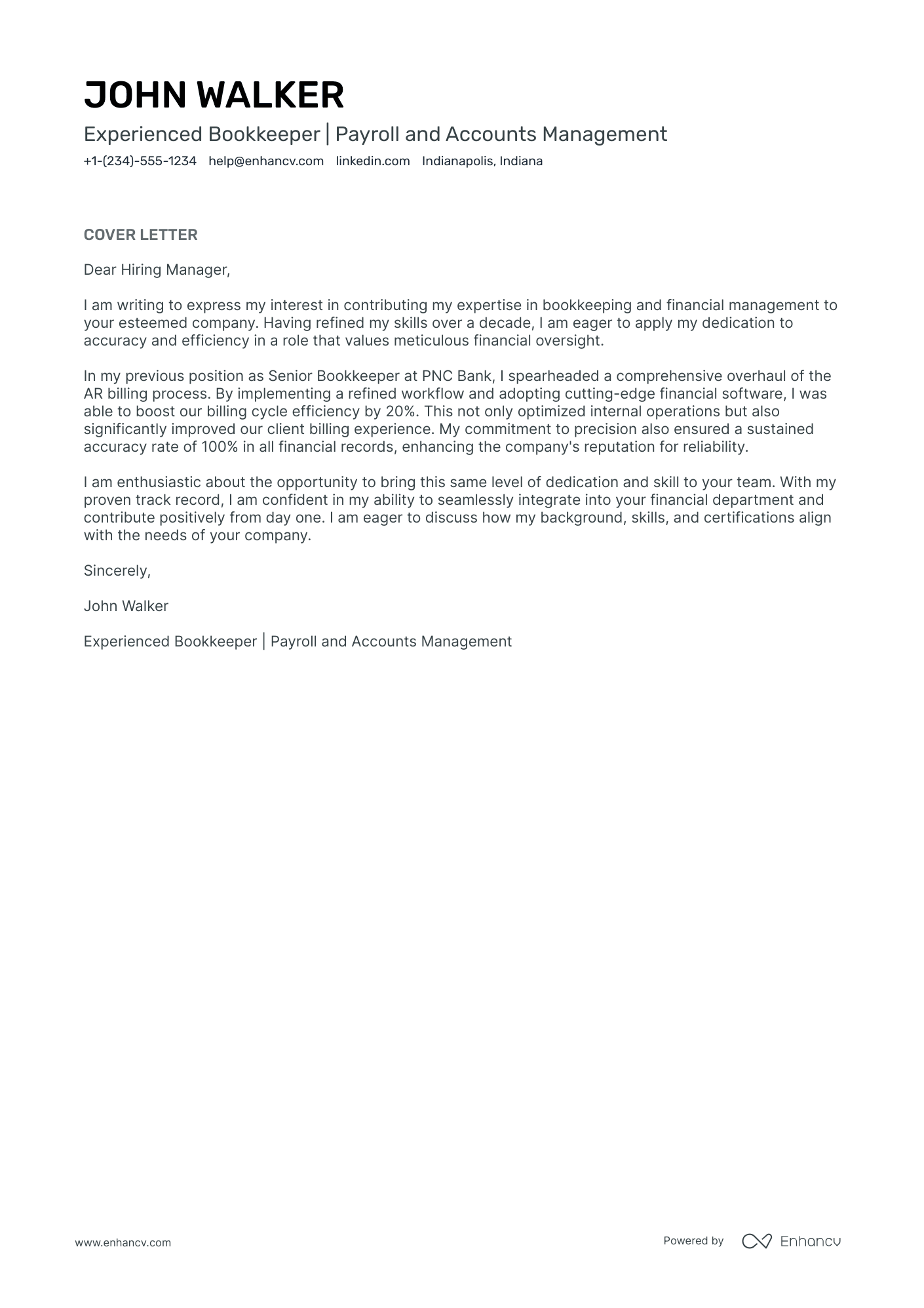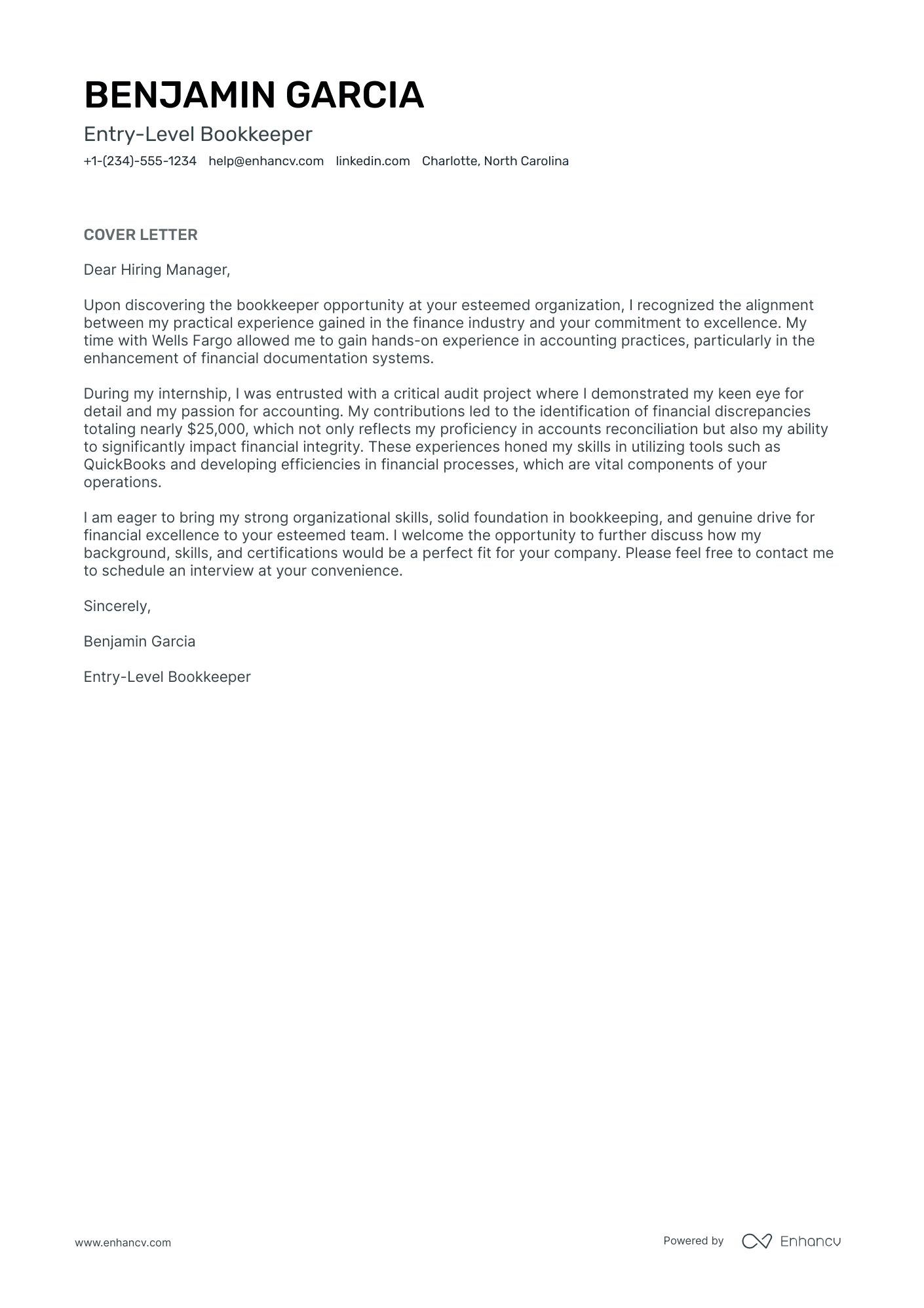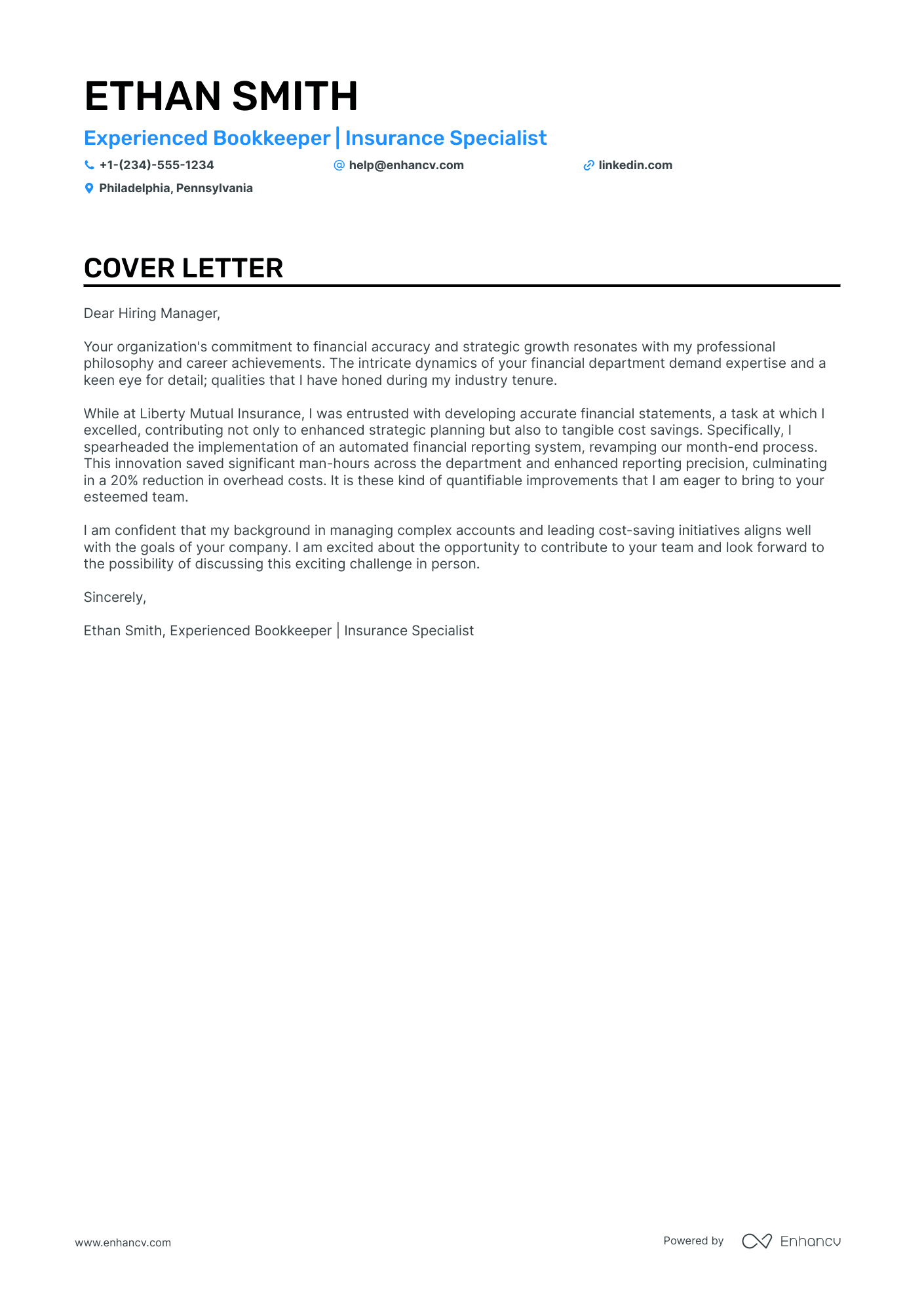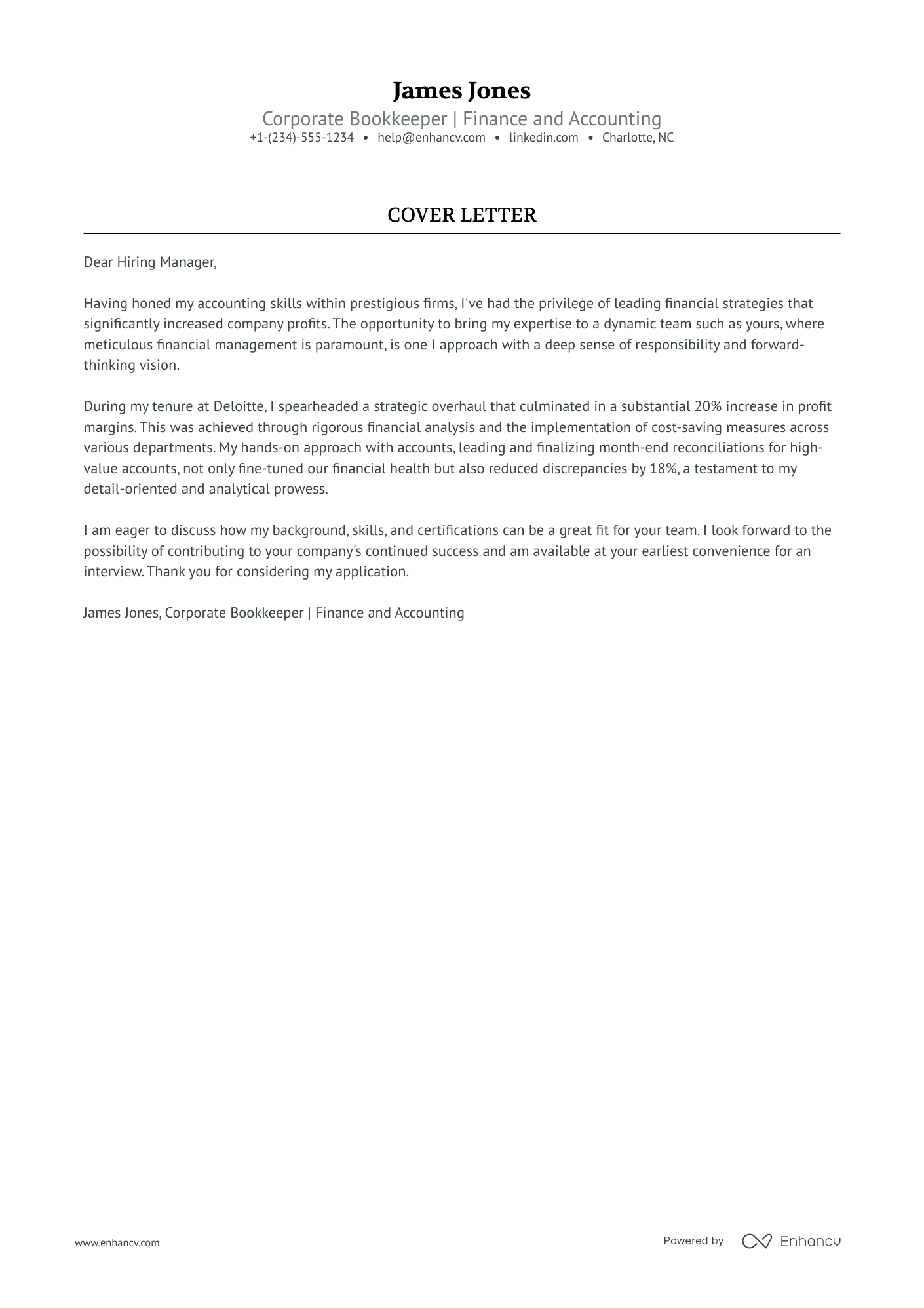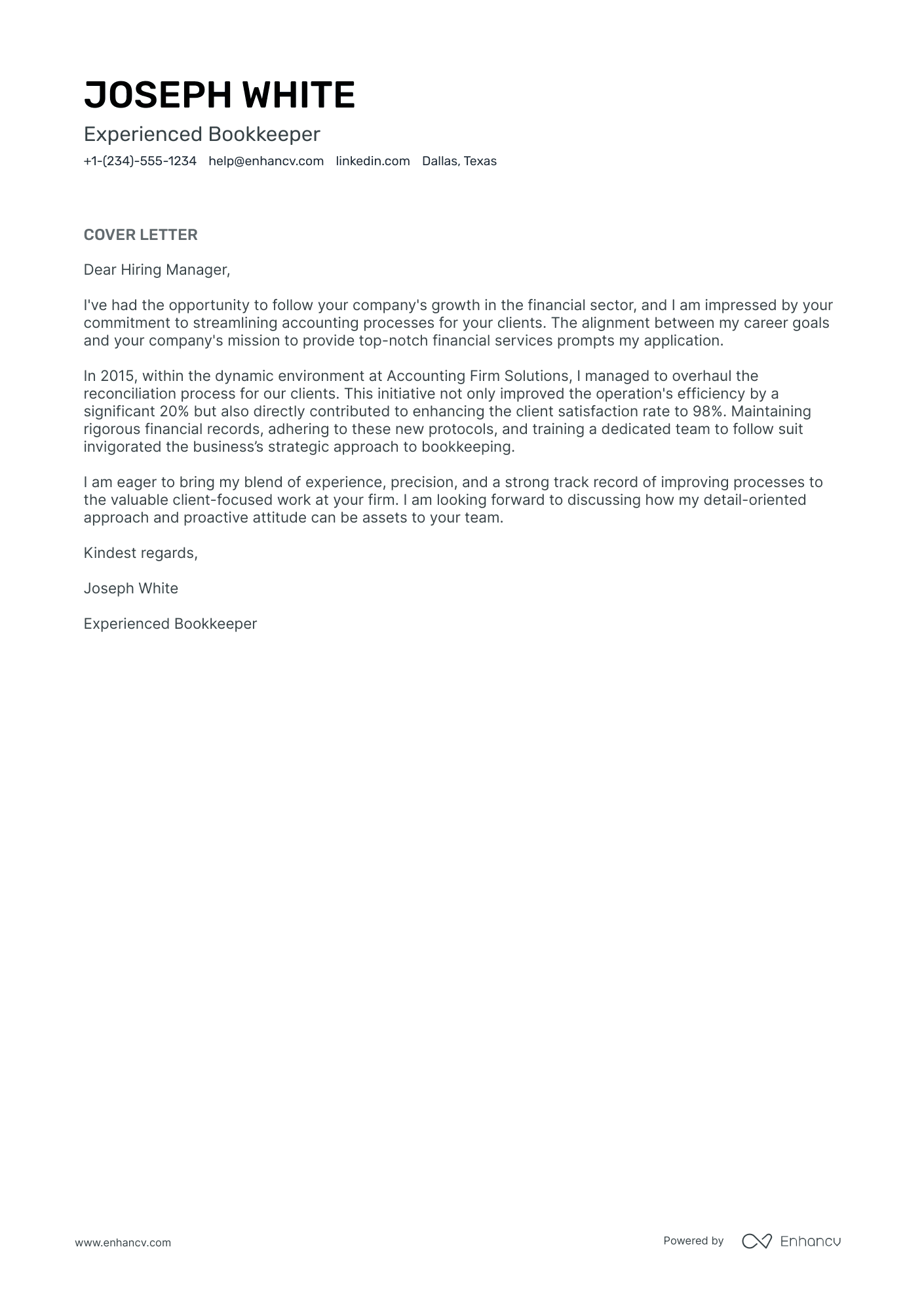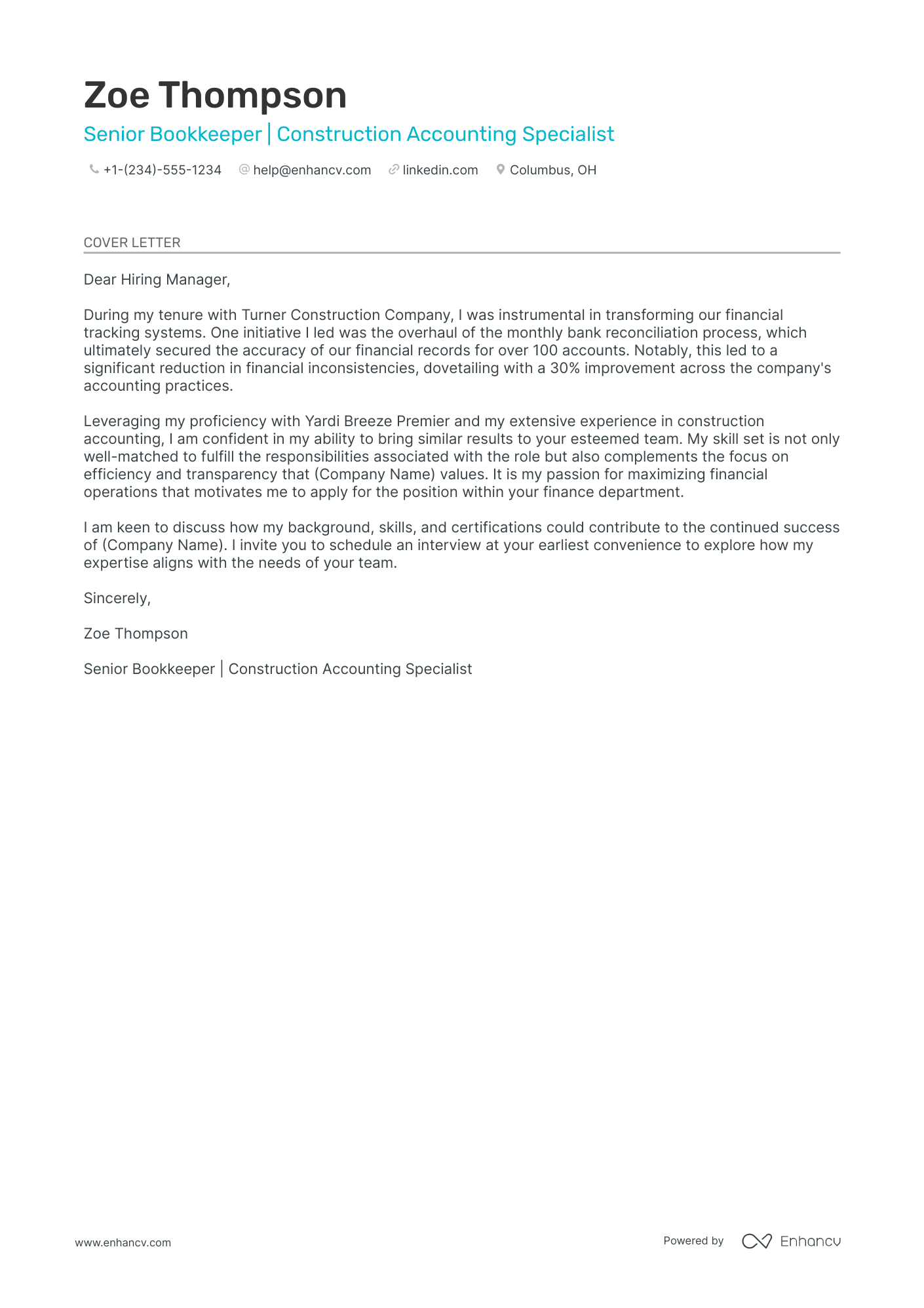Crafting a compelling bookkeeper cover letter can be a daunting challenge, especially if you're already in the thick of job hunting. You understand it's not just a repeat of your resume; it's your chance to share a meaningful professional victory, to narrate the journey behind your proudest achievement in just one page. Steering clear of clichés to maintain formality, you aim to encapsulate your unique value – all while keeping your reader eagerly turning every word. Let's dive into how you can achieve this balance and stand out.
- Writing the essential bookkeeper cover letter sections: balancing your professionalism and personality;
- Mixing storytelling, your unique skill set, and your greatest achievement;
- Providing relevant (and interesting) information with your bookkeeper cover letter, despite your lack of professional experience;
- Finding the perfect format for your[ bookkeeper cover letter, using templates from industry experts.
Leverage the power of Enhancv's AI: upload your resume and our platform will map out how your bookkeeper cover letter should look, in mere moments.
If the bookkeeper isn't exactly the one you're looking for we have a plethora of cover letter examples for jobs like this one:
Drop your resume here or choose a file.
PDF & DOCX only. Max 2MB file size.
Bookkeeper cover letter example
CHRISTIAN TORRES
Dallas, Texas
+1-(234)-555-1234
help@enhancv.com
- Quantifiable Achievements: Mentioning the implementation of a new QuickBooks ledger system and its tangible outcomes (25% improvement in transaction accuracy) demonstrates the candidate's ability to deliver measurable results, which is persuasive evidence of competence.
- Relevant Experience: The candidate's past role at Green Financial Ltd. and their expertise in financial management directly correlate with the responsibilities of the bookkeeping position, emphasizing the applicability of their skills and experience.
- Improving Efficiency: Highlighting the reduction of payment delays by 30% showcases the candidate's focus on process optimization, a crucial aspect for a bookkeeper role looking to enhance financial operations.
The format of your bookkeeper cover letter: structure, fonts, margins, and more
Your bookkeeper cover letter should include a header (with your name, position, and date); a greeting and introductory paragraph; a body and closing paragraphs; and an optional signature.
Remember that you're writing your bookkeeper cover letter for recruiters - as the Applicant Tracker System won't scan this content.
Here are a few more tips and tricks to keep in mind when formatting your bookkeeper cover letter:
- Use the same font in your bookkeeper cover letter and resume. We recommend modern fonts, e.g. Lato and Rubik, to help you stand out, instead of the stereotypical Arial and Times New Roman.
- Each paragraph should have single spacing, which is already set up for you in our cover letter templates.
- Our cover letter builder follows industry standards for your bookkeeper cover letter formatting - with a one-inch margin, surrounding your content.
- Always export your bookkeeper cover letter in PDF to ensure the image or text quality stays the same and your writing isn't moved about.
Cut down the time spent on cover letters. Use our free cover letter generator to create one in seconds.
The top sections on a bookkeeper cover letter
- Header: This section includes your contact information, the date, and the employer's details, conveying professionalism and making it easy for the recruiter to identify who you are and how to contact you.
- Opening Greeting: A personalized greeting addressing the hiring manager by name establishes a connection and shows you have done your research about the company.
- Introduction: In this part, quickly mention your bookkeeping experience and enthusiasm for the role, grabbing the recruiter's attention and setting the stage for your qualifications.
- Professional Experience and Skills: Utilize this section to detail your relevant bookkeeping expertise, proficiency with accounting software, and any relevant certifications, demonstrating your capability for the position.
- Closing and Call to Action: Conclude with a strong closing statement that reiterates your interest in the role, invites further discussion, and expresses your anticipation for a follow-up, ensuring a proactive end to your cover letter.
Key qualities recruiters search for in a candidate’s cover letter
- Proficiency with bookkeeping software (e.g., QuickBooks, Xero): Critical for managing financial data efficiently and accurately.
- Experience with accounts payable/receivable: Ensures understanding of cash flow within the business and the ability to manage debts and invoices.
- Attention to detail: Essential for maintaining accurate financial records and spotting errors that could lead to significant financial discrepancies.
- Strong organizational skills: Allows for efficient handling of financial documentation and records, ensuring easy access and compliance with laws and regulations.
- Communication skills: Important for coordinating with other departments, explaining financial information, and resolving discrepancies.
- Numeracy and analytical skills: Fundamental for processing numerical data, creating reports, and providing insights into the financial health of the organization.
The bookkeeper cover letter salutation: how to address hiring managers
After covering the format of your bookkeeper cover letter, let's look at the salutation.
Back in the day, the cordial "To whom it may concern" or "Dear Sir/Madam", might have worked out fine.
But, nowadays, your cover letter should approach hiring managers on a more personal basis.
So, what to do about your cover letter salutation?
If you've messaged the recruiters and are on a first name basis or a more formal one, use the hiring manager's name in the greeting (e.g. "Dear Sophie," "Dear Ms. Givens", or "Dear Mr. Everett,").
Always aim to make the effort to find out the name of the hiring manager, who'd be assessing your application. Search on LinkedIn, double-check the advert on the corporate website, or message the brand on social media to find out more about the role.
If you can't find the hiring manager's name (and still want to sound professional), use "Dear HR Team,", "Dear Hiring Manager,", or the likes.
List of salutations you can use
- Dear Hiring Manager,
- Dear [Company Name] Recruiting Team,
- Dear [Mr./Ms. Last Name],
- Dear [Department] Leader,
- Dear [Mr./Ms. Last Name] and Team,
- Dear [Title/Position],
The bookkeeper cover letter introduction: focusing on your unique value, with a creative twist
You are not the only one wondering how to start your bookkeeper cover letter. Those first two sentences introduce your profile and should be memorable.
No pressure.
When beginning your bookkeeper cover letter, immediately point out the unique value of working with you. In other words, what you promise to bring to the role by using your past track record of success.
Start your bookkeeper cover letter with a creative twist by telling a joke or stating something relatable. Select this type of introduction only if it aligns with the company culture.
How to write an achievement-focused bookkeeper cover letter body
We've got the intro and greeting covered. Now, comes the most definitive part of your bookkeeper cover letter - the body.
In the next three to six paragraphs, you'd have to answer why should recruiters hire you.
What better way to do this than by storytelling?
And, no, you don't need a "Once upon a time" or "I started from the bottom and made it to the top" career-climbing format to tell a compelling narrative.
Instead, select up to three most relevant skills for the job and look back on your resume.
Find an achievement, that you're proud of, which has taught you these three job-crucial skills.
Quantify your accomplishment, using metrics, and be succinct in the way you describe it.
The ultimate aim would be to show recruiters how this particular success has built up your experience to become an invaluable candidate.
A sincere and original way to end your bookkeeper cover letter
When writing their bookkeeper cover letter, candidates tend to use one of these phrases, "Sincerely yours" or "I look forward to hearing from you".
Both statements show good manners, but your cover letter should end in a more actionable manner.
Write about:
- how you see yourself growing in the role/organization;
- the benefits you would bring about (you'd impress even more with tangible metrics);
- the next steps in the process (provide your availability for interviews).
Addressing limited to no experience in the bookkeeper cover letter
There's nothing to worry about if you lack professional experience.
Your bookkeeper cover letter could bridge the gaps in your professional history by focusing on what matters most to recruiters, that's either:
- skills - focusing on transferable ones you've gained, thanks to your life experience (e.g. volunteering, certificates, etc.);
- achievements - select the most relevant and noteworthy one from your history (e.g. education, projects, etc.);
- motivation - describe how you envision your professional growth in the next up to five years, thanks to this opportunity.
Key takeaways
Writing your bookkeeper cover letter doesn't need to turn into an endless quest, but instead:
- Create an individual bookkeeper cover letter for each role you apply to, based on job criteria (use our builder to transform your resume into a cover letter, which you could edit to match the job);
- Stick with the same font you've used in your resume (e.g. Raleway) and ensure your bookkeeper cover letter is single-spaced and has a one-inch margin all around;
- Introduce your enthusiasm for the role or the company at the beginning of your bookkeeper cover letter to make a good first impression;
- Align what matters most to the company by selecting just one achievement from your experience, that has taught you valuable skills and knowledge for the job;
- End your bookkeeper cover letter like any good story - with a promise for greatness or follow-up for an interview.
Bookkeeper cover letter examples
By Experience
Experienced Bookkeeper
Entry-Level Bookkeeper
By Role
